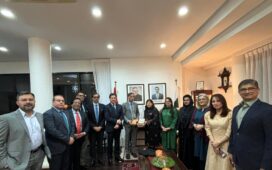The UN Security Council will meet on Wednesday over the decision by the International Court of Justice (ICJ) ordering Israel to prevent death, destruction and any acts of genocide in besieged Gaza.
Algeria requested the meeting late Friday after a closed-door meeting of the UN’s 22-member Arab group, France, which holds the Council presidency this month, said the meeting will take place on Jan 31 at 11 a.m. local time ( 9 PM PST)
On Friday, the court asked Israel must do everything it can to prevent the commission of all acts within the scope of the Genocide Convention.
The court said Israel must take all measures within its power to prevent and punish the direct and public incitement to commit genocide.
It also said that Israel must take immediate and effective measures to enable the provision of urgently needed basic services and humanitarian assistance to address the adverse conditions of life faced by Palestinians.
Additionally, the court ruled that Israel must try to limit death and damage in Gaza.
Highlighting that the ICJ was acutely aware of the extent of the human tragedy unfolding in the region since war erupted in Gaza, Judge Joan Donoghue, the court’s president, said that the court remained deeply concerned about the continuing loss of life and human suffering.
Meanwhile, UN Secretary-General Antonio Guterres noted in a statement the measures pertaining to the Israeli military laid out in the provisional ruling and stressed that “decisions of the Court are binding” and trusts that all parties will duly comply with the order from the Court.
“In accordance with the Statute of the Court, the Secretary-General will promptly transmit the notice of the provisional measures ordered by the court to the Security Council,” UN Spokesperson Stphane Dujarric said.
Donoghue said that the court remained deeply concerned about the continuing loss of life and human suffering
Palestine’s ambassador to the UN, Riyad Mansour, said that the ICJ decision gives the clear message that in order to do all the things that they are asking for, you need a ceasefire for it to happen.
So fasten your seat belts, he said, hinting that the Arab Group, represented on the Council by Algeria, would push for ceasefire.
The Security Council, long divided on the Israeli-Palestinian issue, has only agreed to two resolutions since October 7.
In December, it demanded aid deliveries at scale to Gaza’s besieged population, while Israel’s ally the United States has kept out calls for a ceasefire despite international pressure.
In its case, which began earlier this month in The Hague, South Africa asked the court a principal organ of the UN to indicate proprovisional measures in order to protect against further severe and irreparable harm to the rights of the Palestinian people under the Genocide Convention.
Among the measures South Africa asked for was the immediate suspension of military operations by Israel in the Strip and that its forces take all reasonable measures to prevent genocide.
South Africa also asked the world court to order Israel to prevent forced displacement, allow adequate food and water to reach civilians and ensure that evidence of any potential genocide is preserved.
Provisional measures are a type of temporary injunction ahead of a final decision on the dispute. It is likely to take years before a judgement is reached.
The measures are considered mandatory for implementation, but the Court has no means of enforcing them.
Israel argued in presenting its case that the war on Hamas was one purely of defence and not against the Palestinian people.
Lawyers for Israel said that provisional measures, if granted, would amount to an attempt to deny Israel its ability to meet its obligations to the defence of its citizens, to the hostages and to over 110,000 displaced Israelis.
In Dublin, large crowds gathered outside Leinster House on Wednesday calling for the Irish government to publicly support South Africa’s genocide case against Israel.
The government had said it was waiting until the case passed the preliminary stage before it showed support for it a decision that sparked outrage among the public and the opposition.






